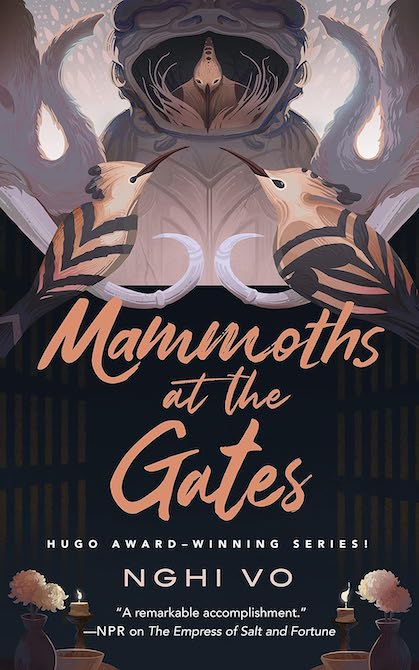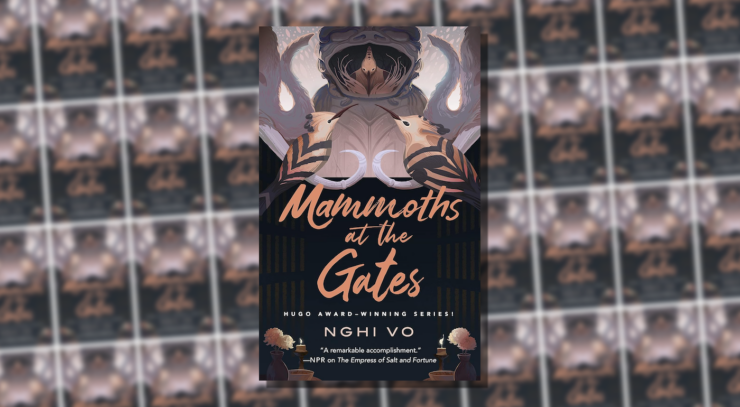Every story ended with the tiny picture of a mammoth following the last line of text, because mammoths came at the end, after stories, after dynasties, after empires. After abbeys too, Chih thought uneasily, and they looked around at the walls that seemed through all their life to be the most solid things in the world. (15)
No single thing takes away from the rest. (112)
The fourth installment of the Singing Hills cycle is a natural curve in the arc of this clever series. While the novellas can be read in any order—a difficult feat I trust Nghi Vo has executed elegantly—I’m glad I read these first four in the order they were published at least the first time around. Mammoths at the Gates delivers a shift that hits more completely after spending three books with Chih. More than that, it recontextualizes both the plot and the metanarrative at a deliberate pace that feels truest and most pleasurably impactful.
The Singing Hills cycle has always been fundamentally about the sustenance of archive—about story, history, the many variations within. The wild, wicked, wondrous range of ways “official records” come to be, and shape the world that follows.
After their latest routes as traveling cleric, Chih returns to Singing Hills, eager for the comforts of home. The abbey has only ever been solace to them, their way back bright with nostalgia.
But royal mammoths mar the familiar gates before the abbey, a grieving corporal on a mission to retrieve the body of a cleric who means something different to her than they do for Chih and Singing Hills. Thein was their mentor—someone who had seemed, in the misty eyes of childhood, to be eternally old, and thus eternally alive in that oldness. To young Corporal Vi In Yee and her more solemn sister Tui In Hao, Cleric Thein was their grandfather, a distant patriarch, a thousand stories that shaped their world. As two emotionally charged factions wrestle over the right to Thein’s body and legacy, Chih and their loved ones confront the raucous monstrosity of grief—its many shifting faces and many grasping arms, its tremendous ability to transform, or strip away, the way it weaponizes time: compresses it viscerally, stretches it to vast blank pain. A lifetime of love, legible there in a cracked hairbrush.
Throughout the series, Chih has been protagonist and archivist at once: our entrypoint into their world, and intentionally as much of a blank slate as possible. They are the story, but they are also the frame and the narrator. They are meant to collect, to document: to note differing perspectives and unearth history by digging at its corners, straying beyond the dusty spines of the abbey’s archive and filling in the blanks with the transcribed voices of those who got left out the first time—those sidelined as villain or victim, designated unimportant or simply unheard.
Buy the Book


Mammoths at the Gates
Chih has always been aware that the story someone tells them isn’t the only story of what happened, and so can never be absolute truth—but unless there are other perspectives, that’s what gets remembered. The story is as fallible or true as its teller. The story is: who is telling it, when they tell it, how they tell it, and to whom. The story is: how many times they tell it, what they forget, and what they leave out. If there’s always more to a story, then when are any stories done? When do they have an effect? The story is a paradox: eternally incomplete because there will always be sides unrecorded, and therefore entire in whatever version it’s told. Some are details, meaningless in the end, and some could change empires.
Chih knows this. But this is the first real time they have to confront what they, in theory, already knew: They themself are not exempt—and neither are their loved ones. Archivists are meant to document, not editorialize. Their neixin companions remember flawlessly, choicelessly. And so the truth is both malleable, and not.
Mammoths at the Gates is my favorite so far, and I love this series. This is truly a homecoming for Chih, in the Homeric sense, and that means reevaluating what they once trusted was safe. Revisiting halcyon innocence with older eyes that can’t help but bear witness to the uneasy truth howling beneath it. This series is knowingly, brilliantly metatextual: You can never be outside the story you’re telling. The mythic monster at the center of the maze is something, or someone, all too familiar. A reckoning with what is and is not home.
No archive is neutral. Moral high ground is never fixed. Family isn’t a clear or simple thing, even when it’s chosen. There are only people, hurting each other, haunting each other, loving each other, doing our best. Telling our stories as best we remember, or as suits our purpose, the lines blurring unevenly.
Like the rest of the Singing Hills cycle, Mammoths at the Gates is clever and tender, textured with warm humor and quiet queer joy. But this one’s blunter, a reckoning. It is a coda to the first book, stepping in the same river twice—yet it is not the same river and you are not the same reader, in so many ways. And in so many ways, it is and you are. That simultaneity, that dissonance, the palimpsest of existence: You are all the versions of you you ever were, which is to say you’re not who you were, but that person is still a part of you, shaping what came before, and who you are now. That’s what a story is. We are all a thousand stories. We are also what we do to each other. When you hurt a loved one, you don’t get to tell a thousand stories of times you didn’t in order to cancel out your actions.
It will work for you as a satisfying next step in the series or it won’t, but do expect it to feel different. It’s extremely effective for me, there in Vo’s precise, elegant hand. Threading the narrative back in time and then through to Chih’s present again, grief and mortality constant at the edges of a tapestry of a universe, blossoming with brief, bright life.
The tonal shift makes sense. It feels natural. After the last two books, it also feels surprising, because it’s different, but also not, because it feels inevitable. Of course the story has to come for Chih. They are not only a vessel. No story is without bias: nor is any storyteller, or certainly any institution. Of course the story has to come to grief, more personal and uncomfortable than before. No story doesn’t, if you tell it long enough. If you keep going, though, it’ll come around to joy again.
This is a story about what it means to be human: the imperfection of heroes, and the violent, inevitable chrysalis of grief. Exquisite as always, Nghi Vo’s latest is a gleaming addition to this astonishing gift of a series.
Mammoths at the Gates is published by Tordotcom.










